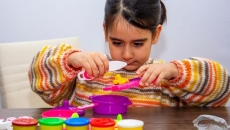New Delhi, Sep 13 (IANSlife) Parenting can be difficult, but managing conflicts with your child is an essential part of that. It's an opportunity to impart to children valuable life lessons like empathy, communication, and how to resolve conflicts.
Keep in mind that disagreements are a natural component of interpersonal communication and present a chance for development. You may support your child's development of important life skills and improve your relationship with them by treating conflicts with patience, empathy, and a focus on teaching constructive communication.
Following are some points mentioned by Megha Chopra, Entrepreneur, and Poet, to handle disputes with your child:
Avoid getting into an argument: Avoid answering your child's argument with one of your own. Instead, give her a clear explanation of your viewpoint and go away. Everyone loses when we make parenting decisions in response to a child's disagreements and conflicts.
Stay calm: It's crucial to remain calm and composed during arguments. Avoid reacting emotionally or becoming defensive. Being composed provides a good example for your child, who frequently imitates your emotional condition.
Actively listening: By paying attention to what your child has to say, you may demonstrate to them how much you appreciate their viewpoint. To be sure you have understood them accurately, make eye contact, and rephrase their perspective. They experience being heard and understood as a result.
Set boundaries: Make sure your youngster is aware of the limitations and guidelines in your home. When a disagreement arises, remind them of these limitations. To make sure your child understands what is expected of them, go over the rules and guidelines with them. By letting your youngster know what is expected, consistent rules can help prevent disagreements.
Problem-Solving: Encourage your child to come up with possible solutions to the issue. They may get critical thinking and conflict-resolution abilities through this. Find concessions that you and your child can both accept by working together.
Set a Good Example: Show healthy communication by refraining from yelling, calling others names, or using derogatory terminology. Since your child picks up on your actions, it is essential to communicate respectfully.
Teach compromise: Educate your child on the value of compromise and locating common ground. Encourage them to think about not just their own needs and viewpoints, but also those of others.
Teach Problem-Solving: Teach your child to solve problems by encouraging them to come up with solutions to the issues they are arguing about. They gain critical thinking and conflict-resolution abilities as a result of this. By questioning them “How could you want to solve this problem?”
Praise Positive Behavior: When your child handles conflicts with maturity and respect, praise and reward them. They may be inspired to continue practising effective communication skills through encouragement.
Seek Professional Assistance if Needed: Consider seeking professional assistance if fights with your child become frequent, heated, or detrimental to their wellbeing. You and your child can receive helpful direction and support from a child psychologist or family therapist as you negotiate difficult situations.
If you approach handling your child's conflicts with compassion, empathy, and efficient communication, it may be a pleasant experience. You can successfully handle conflicts with your child by carefully listening, empathising, and giving clear expectations. Keep in mind that conflicts between parents and children are common. Your aim should be to show your child respectful communication skills and dispute-resolution techniques. A healthy parent-child connection also depends on maintaining a strong relationship. Also, every child is different, so it could take some time to find the best strategy for your particular circumstance.






